This article is part of a series being shared to highlight activist struggles across Europe and grassroots response to health and economic crisis. These articles are shared in preparation for the event ‘Reclaiming the commons: From austerity and debt to public space and health as commons’ which will take place next Wed 27th Jan.
Introduction
From one crisis to another. From the 2008 economic crisis to the Covid-19 crisis. We have suffered the impact of cuts in public services and we have seen communities and activists react by creating spaces of mutual aid and self-organization to collectively take charge of care with an inclusive conception of care: no only by giving access to medical services and equipment, but also by offering solidarity in the form of psychological support, defense against domestic violence, for housing and income maintenance and for access to culture.
The COVID-19 crisis is not just a public health crisis just as the economic crisis will not be just a debt crisis. Separating the two is artificial. In view of the event organized in December 2020, it was proposed to the participants of the “Horizon Communs” project to present initiatives and shared reflection on the ways in which activists organized themselves in response to these crises. We have tried to bring together a few initiatives carried out in Grenoble, more particularly in the emblematic district of Villeneuve.
MARCH 2020: Neighborhood solidarity
The COVID-19 pandemic spread in France from March 2020. From mid-March, all public spaces were closed to confine the population to their homes. The implementation of containment coincided with the first round of municipal elections. For two months, access to public spaces was very limited. This period was marked by an extraordinary solidarity of the inhabitants and an exceptional mobilization of public services, in particular in the field of health.
In Grenoble, the first mobilization of residents focused on the reopening of markets to ensure access and support for local producers of fruit, vegetables, eggs … This mobilization was first triggered on social networks. quickly relayed by the mayor of Grenoble who obtained the reopening of the markets from the first week of confinement.
Self-help groups have been set up at the level of buildings, districts and the city. The aim was to prevent people from remaining isolated, with particular attention to the elderly. A multitude of initiatives have taken place: distribution of food, making fabric masks, shopping for the elderly or people with reduced mobility, distance tutoring, residents’ choir …
APRIL 2020: Taking care of Villeneuve
During confinement, our public space took on other forms. Obviously, there was a lot of discussion on the internet, but we also noticed other initiatives that used the window as a new public space. As the architect Hundertwasser said, the inhabitants have a right to the window.
In Grenoble as elsewhere in Europe, the inhabitants took up positions at the windows to applaud all the health personnel, every evening at 8 p.m. At the Villeneuve de Grenoble, residents and several musicians sang every evening at 6 p.m. from their balconies and windows. This initiative was relayed by local media, which helped spread a positive image of the neighborhood. You could hear anti-fascist songs like Bella Ciao and songs written by Marie Mazille and Franck Argentier which were heavily disseminated on social media.

More info: https://www.lecrieur.net/au-170-la-musique-se-joue-confinement/ and https://www.youtube.com/watch?v=0w5eAOkkN18
Beyond the idea of the “Right to the Window”, the notion of “taking care of our neighborhood” was expressed as a Common Horizon to be reached for the ‘to come up. From this slogan, an evening was organized to build proposals in the face of the crisis. It was about supporting and amplifying mutual aid and solidarity initiatives, relaying the campaign on the moratorium on rents and charges and formulating proposals to imagine the future, take care of the neighborhood and promote the well-being of inhabitants during this difficult period. During this meeting, the inhabitants and associations were able to share information on mutual activities.
Numerous solidarity and mutual aid initiatives have been presented, for example in support of families in difficulty or the dissemination of cultural activities. During the confinement, Madame Ruetabaga and the House of Ideas, for example, produced a small kit for children to produce books. The show room, Espace 600, carried out a project entitled “people at the end of the wire” while people from the Olympic village offered to make drawings for a collective exhibition.

MAY 2020: Rent moratorium campaign
Throughout the confinement, calls to strike rents and charges have multiplied. The Right to Housing and the tenants’ federations have written to the mayor of Grenoble to request a moratorium on rents from the mayor of Grenoble. The RIC Arlequin group has disseminated the rent moratorium to 1,000 Arlequin tenants. In addition, a call for signature was sent out within the Villeneuve associations to support the moratorium. The Citizen Alliance has taken a complementary approach by sending a letter to elected officials asking for the reduction and cancellation of rents and charges in ways targeted at families in difficulty.
When it was possible to meet in the public space, the activists organized actions. On Saturday May 30, about fifteen people gathered on the market place of Villeneuve with a double objective: to talk about the national campaign for a moratorium on rents and to kick off a vast survey among residents of Harlequin on their loss of income during confinement.


As Raphaël Beth clarified in an article published in the Crieur de la Villeneuve: “Social landlords have taken steps, on a case-by-case basis, in the event of difficulty in paying the rent. However, you have to be able to prove your loss of income in order to benefit from assistance. When it is informal income, it is not possible to do it. The survey, via questionnaires to be completed, will be able to show the extent of the loss of income for tenants. ” (See https://www.lecrieur.net/une-enquete-sur-les-pertes-de-revenu).
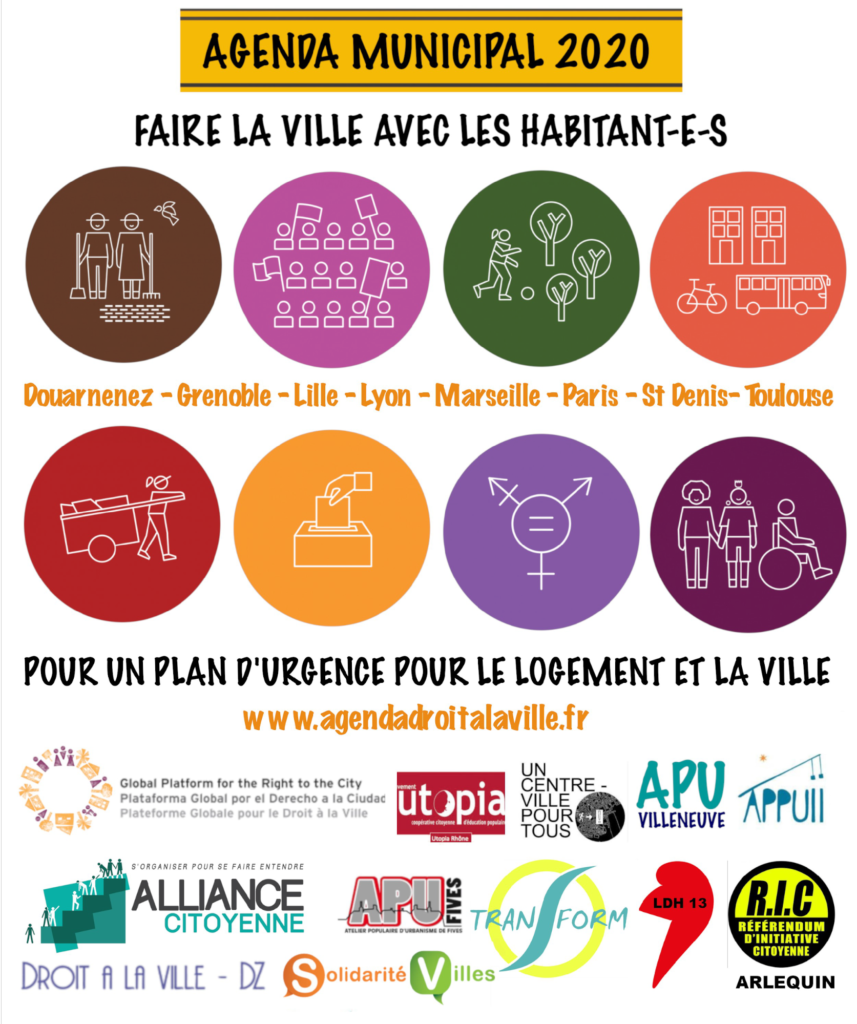 JUNE 2020: Advocacy for the Right to the City
JUNE 2020: Advocacy for the Right to the City
During the first round of municipal elections in March 2020, organizations of residents of Grenoble, Lyon and Marseille initiated the campaign “The Agenda for the Right to the City” which brought together 350 proposals. The end of this advocacy campaign was marked by the implementation of confinement which coincided with the first round of municipal elections.
For the second round, which took place on June 28, residents’ organizations decided to conduct a new advocacy campaign to debate our demands for the construction of an agenda for the right to the city. To respond to this crisis, two sets of proposals seemed priority:
-An emergency plan for housing and the city
- suspension of rent and charges for families in difficulty ,
- prohibition of evictions without a rehousing solution,
- a compensation fund for affected donors and local public services.
These emergency measures are to be incorporated into an exceptional plan for housing and the city co-built with the inhabitants, in compliance with environmental rules, aimed at including
- the objective of 30% social housing by 2030 in the Local housing plan and at the neighborhood level to fight against urban segregation,
- increase substantially the number of places in accommodation to meet the goal of zero people living on the street.
-The democratization of the making of the city
For years, residents’ organizations have demanded to be associated with the making of the city. Despite the reform of city policy in 2014 which introduced the principle of co-construction, concrete changes are still pending.
To put the inhabitants back at the center of these projects, we ask to:
- Open up to all citizens and their representatives the technical and political bodies of urban projects to ensure the transparency of public action and the real co-construction of projects.
- Establish instruments of direct democracy, such as the citizens’ initiative referendum, to promote the real expression of those first concerned.
- Set up specific financial resources, such as the citizens’ initiative fund or the 1% citizenship, to provide residents with the means necessary for independent expertise and the recognition of their knowledge of use
- Democratize the operation of social landlords through local urban management and the co-construction of rehabilitation operations.
- Reform the national urban renewal agency based on a bill to strengthen the implementation of the agenda for the right to the city (see appendix).
JULY & AUGUST 2020: Reappropriation of public space
After these long weeks of confinement, everyone wanted to spend the whole summer in the great outdoors, chat with their neighbors in the shade of a tree, relax for a few hours and find their own. freedom !
As every year, a collective of associations proposed to gather around the small lake of Villeneuve to reclaim public space, to take care of oneself, of others, of our neighborhood, of our city. Throughout the summer, associations in Villeneuve and elsewhere have planned activities, workshops, storytelling, demonstrations, shows, concerts, a refreshment bar and small dishes to enjoy.
Residents could come alone or with their families, with their neighbors from 4 p.m. to 9 p.m. to enjoy the long days, sunny afternoons and balmy summer evenings! If the event was a real popular success with several hundred participants, it was also marked by several episodes of violence. From the confinement, the associations warned of the rise in domestic violence which risked having repercussions on the public space.
The presence of associations and residents in the public space made it possible to discuss this situation and meet at the start of the school year for the fortnight of non-violence.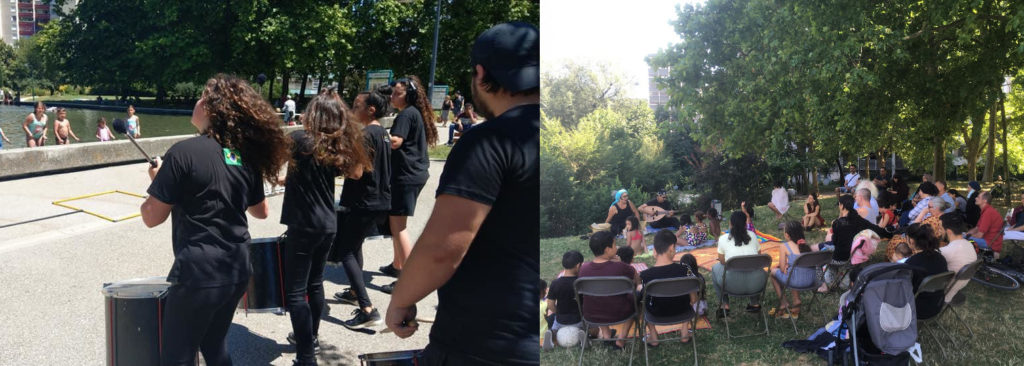
OCTOBER 2020: Fortnight of non-violence
At the start of the 2020 school year, the inhabitants and associations of La Villeneuve met for the fortnight of non-violence organized for several years. Despite the health constraints that caused the cancellation of many events, it was possible to organize several initiatives including a meeting at the associative café “Le Barathym” aimed at formulating proposals to reinvent prevention with the inhabitants.
This initiative proposes to draw inspiration from the methods of civic leadership in Bogota, which enabled a spectacular improvement in the security of the city between 1994 and 2003 (source EFUS.eu). Bogota’s method is to promote civic culture, help to peacefully resolve conflicts between people, help the most vulnerable groups of the population, reduce the risk of crime and train key community actors in development of a strategy to strengthen citizen participation and prevention.
The aim is to tackle the causes of violence and delinquency. Personal and family factors, exposure to violence, poor housing, environment, schooling and local conditions, and inequalities are all risk factors associated with delinquency, often exacerbated by the presence of drugs. and weapons, and the lack of opportunities for social reintegration.
 NOVEMBER 2020: Villeneuve Digital
NOVEMBER 2020: Villeneuve Digital
As in the first containment, Villeneuve Digital approach was established to support the residents, associations and groups to continue their activities remotely and supporting paperwork, etc …
This has allowed us to makes free digital tools available to a group of neighbors, a building committee, an association or collective. Residents could create shared folders on a cloud dedicated to Villeneuve to share collaborative documents, share reports and other documents. It was about seeing to what extent digital commons could support urban commons during the confinement period.
NOVEMBER 2020: Tribute to André Béranger
 The COVID crisis is a period that has been deeply marked by the death of members of our communities, either because of the virus or other diseases. Sanitary restrictions have forced families to organize celebrations in small groups. In La Villeneuve, the inhabitants paid tribute to André Béranger, a pioneer of the Harlequin, a teacher and activist of the Villeneuve de Grenoble who defended human rights throughout his life, in particular the right to education, the right to housing and the right to the city.
The COVID crisis is a period that has been deeply marked by the death of members of our communities, either because of the virus or other diseases. Sanitary restrictions have forced families to organize celebrations in small groups. In La Villeneuve, the inhabitants paid tribute to André Béranger, a pioneer of the Harlequin, a teacher and activist of the Villeneuve de Grenoble who defended human rights throughout his life, in particular the right to education, the right to housing and the right to the city.
André Béranger had remained faithful to the political project of La Villeneuve. Looking to the future, he considered La Villeneuve to be a common good to be defended and passed on to future generations while preserving popular housing. He co-founded the Villeneuve Debout association the day after the summer of 2010, then the collective against demolitions and supported the establishment of the Atelier Populaire d’Urbanisme (APU).
André Béranger will undeniably remain a major figure in La Villeneuve, as evidenced by the tribute paid to him in full confinement. The day before his death, dozens of residents gathered to sing engaged songs to the rhythm of the percussions, chanting his first name as they saw his silhouette at the window of his building in the Galerie de l’Arlequin.
A wink to André screening took place on Friday, November 27 on 10 Arlequin (where André and Ariane lived from 1973 to 1980, just above the Ecole des Charmes) in partnership with the Maison de l’image and Videogazette (Let’shttps://www.videogazette.net)
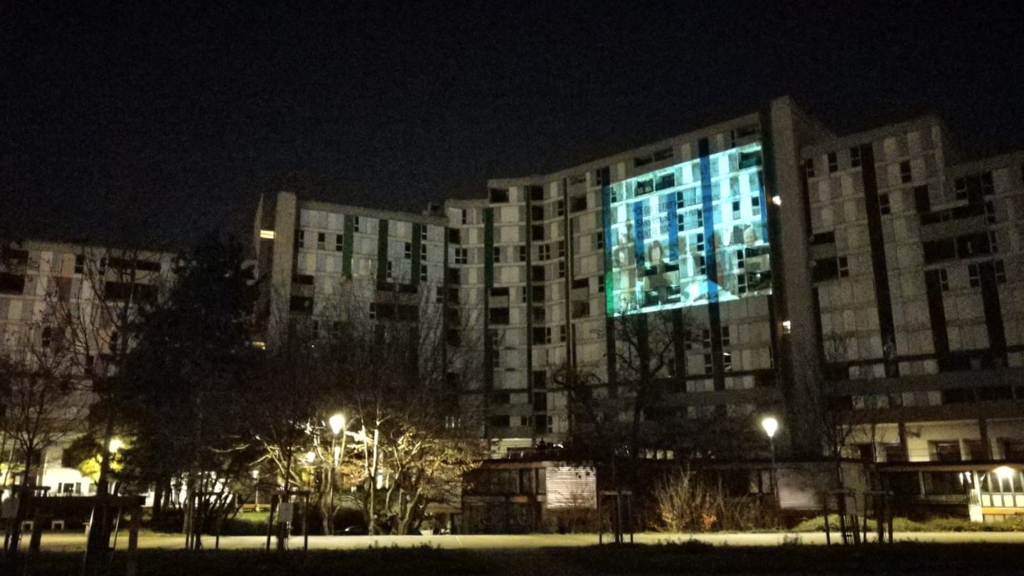
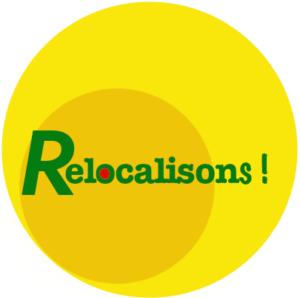 DECEMBER 2020: Relocate!
DECEMBER 2020: Relocate!
On December 4, the members of the Exporterre team in partnership with Transform ‘launched the “Relocalisons! »Which proposes to imagine the local production of ten objects and services of daily life in the Grenoble area so that they become common goods. This initiative is a continuation of the work carried out by the Exporterre team on the informal economy in working-class neighborhoods.
While in the context of the health, social, economic and ecological crisis, relocation today appears to be obvious to everyone, it is now necessary to move from the idea to its realization. This first meeting made it possible to confirm the interest of the partners and begin to define a list of ten objects and services that will be worked together during participatory workshops that will take place from January to April 2021 to identify skills, think about eco-design and the life cycle of objects and services.
Conclusion: Reflection on health, debt and urban commons
From a local perspective, the links between health, debt and urban commons are obvious. The survey of unpaid rents allowed us to see that 80% of residents claim to have had financial difficulties since the start of confinement and 60% of residents surveyed have suffered loss of income. It is likely that this situation will lead to an increase in debt and we know that debt can spiral downwards leading to deterioration in health. During confinement, solidarity actions were carried out between neighbors, supported by digital commons. The idea of taking care of one’s neighborhood has spread, in a broader vision of the idea of care. When it has been possible to get out into the great outdoors, we have launched initiatives to reclaim the urban commons through actions in the public space and organize cultural activities.
During this time, some of us were marked by the deaths of loved ones. In La Villeneuve, the teacher and activist André Béranger died on November 15, 2020, the day after a tribute from his friends and neighbors. Despite all the actions, we are worried about the impact of the health crisis on the health of the inhabitants, the difficulties of access to care and the worsening of living conditions. We note that despite numerous alerts, social landlords have not set up specific measures to help tenants who have health problems. We also note that many residents do not receive a response to their request for suitable housing. We are concerned about the elderly and the isolated. It is urgent to put health at the center of our reflections, to strengthen prevention and support for families whose members may be affected by a chronic or serious illness. Beyond solidarity, we propose to reflect on the link between health and housing through a campaign to challenge all stakeholders: residents, associations, health centers, health personnel, social workers, municipal health service, CHU and donors. social to reflect together on how to better take into account the health of residents.
We do not know if the link we made at the local level between health, debt and urban commons can be transposed to other scales. We are aware that neoliberal globalization has caused cuts in public services which are increasingly weakened and that we have been obliged to organize ourselves to take charge of certain actions. But, it is important to be collectively vigilant in the face of the probable return of austerity once the health crisis is over. We must also learn from the events we are going through to prepare for future social, health, financial, economic and climate crises. In this slump, we wish to look at the horizon which, we wish, will be a Horizon in Common.
CREDITS:
Editor: David Gabriel, Next Planning for the Assembly of Commons of Grenoble. Contact:
planning@zaclys.net
Photos and Illustrations: p2, Benjamin Bultel, www.lecrieur.net ; illustration Next Planning, p4, Benjamin
Bultel www.lecrieur.net, illustration Next Planning, p6, photos Villeneuve Plage: Next Planning, p8: photo
APU, anonymous, projection Wink to André, photo Willy Lavastre, p9, logo Relocalisons , Next Planning.
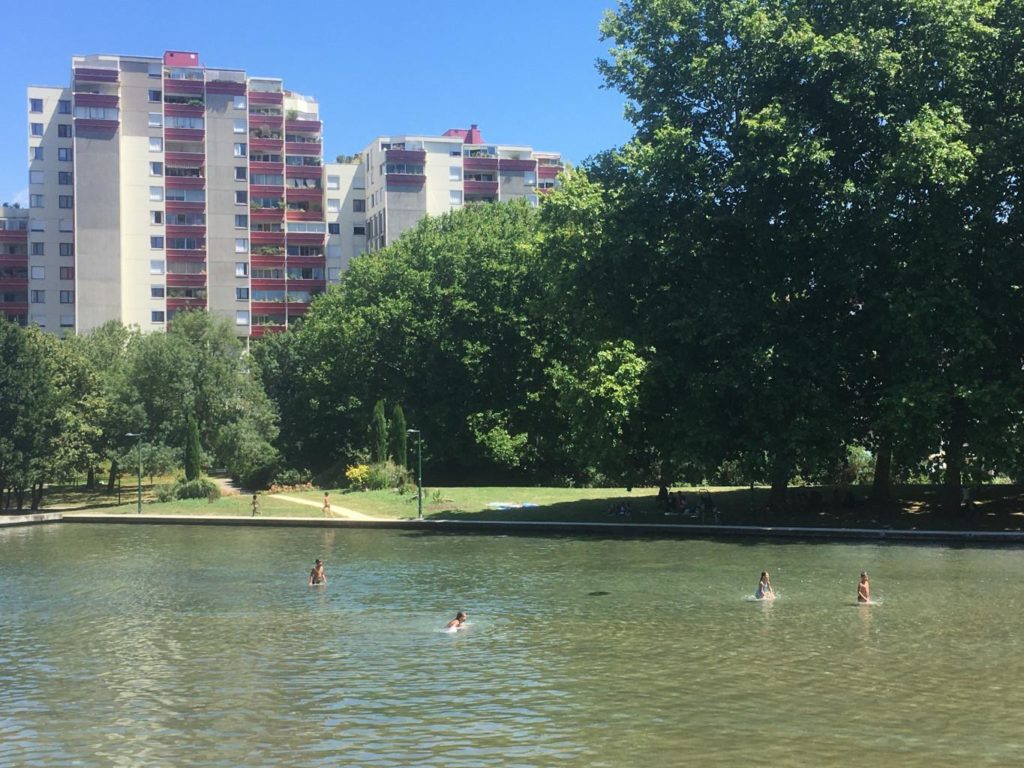
Leave a Reply